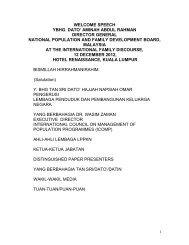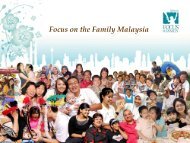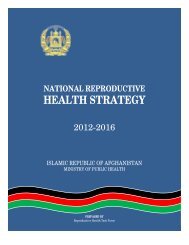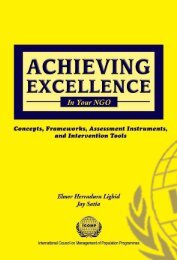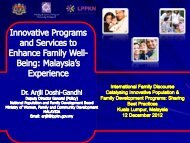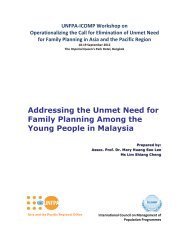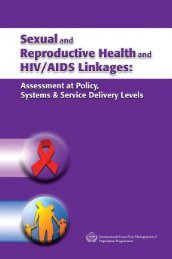Family Planning in Asia and the Pacific - International Council on ...
Family Planning in Asia and the Pacific - International Council on ...
Family Planning in Asia and the Pacific - International Council on ...
Create successful ePaper yourself
Turn your PDF publications into a flip-book with our unique Google optimized e-Paper software.
H<strong>on</strong>. Mr. Malakai Tabar, Chairman, ParliamentarianGroup <strong>on</strong> Populati<strong>on</strong>, Development <str<strong>on</strong>g>and</str<strong>on</strong>g> <str<strong>on</strong>g>the</str<strong>on</strong>g>Millennium Development Goals, Papua New Gu<str<strong>on</strong>g>in</str<strong>on</strong>g>eaH<strong>on</strong>. Mr. Malakai Tabar emphasized <str<strong>on</strong>g>the</str<strong>on</strong>g> need forencourag<str<strong>on</strong>g>in</str<strong>on</strong>g>g resp<strong>on</strong>sible government officials to takeacti<strong>on</strong>, supported by evidence <str<strong>on</strong>g>and</str<strong>on</strong>g> data. The newlyestablished Committee <strong>on</strong> Populati<strong>on</strong>, Development<str<strong>on</strong>g>and</str<strong>on</strong>g> <str<strong>on</strong>g>the</str<strong>on</strong>g> MDGs was highlighted as <strong>on</strong>e way throughwhich <str<strong>on</strong>g>the</str<strong>on</strong>g> country could move forward. He reiterated<str<strong>on</strong>g>the</str<strong>on</strong>g> need for committee members to make effective useof <str<strong>on</strong>g>in</str<strong>on</strong>g>formati<strong>on</strong> <str<strong>on</strong>g>and</str<strong>on</strong>g> surveys. The need to advocate <strong>on</strong>all levels of government, <str<strong>on</strong>g>in</str<strong>on</strong>g>clud<str<strong>on</strong>g>in</str<strong>on</strong>g>g prov<str<strong>on</strong>g>in</str<strong>on</strong>g>ces <str<strong>on</strong>g>and</str<strong>on</strong>g> ruralareas, was also addressed.H<strong>on</strong>. Mr. Raym<strong>on</strong>d Palat<str<strong>on</strong>g>in</str<strong>on</strong>g>o, C<strong>on</strong>gressman,Philipp<str<strong>on</strong>g>in</str<strong>on</strong>g>e C<strong>on</strong>gress.H<strong>on</strong>. Mr. Paym<strong>on</strong>d Palat<str<strong>on</strong>g>in</str<strong>on</strong>g>o presented experiences froma recent meet<str<strong>on</strong>g>in</str<strong>on</strong>g>g of young parliamentarians to advocatefor RH <str<strong>on</strong>g>and</str<strong>on</strong>g> family plann<str<strong>on</strong>g>in</str<strong>on</strong>g>g for youth. It was evidentthat youth did know about RH <str<strong>on</strong>g>and</str<strong>on</strong>g> FP so effortsfrom <str<strong>on</strong>g>the</str<strong>on</strong>g> past had been not wasted. He stressed <str<strong>on</strong>g>the</str<strong>on</strong>g>importance of mak<str<strong>on</strong>g>in</str<strong>on</strong>g>g commitments to mobilize o<str<strong>on</strong>g>the</str<strong>on</strong>g>rparliamentarians <str<strong>on</strong>g>and</str<strong>on</strong>g> <str<strong>on</strong>g>the</str<strong>on</strong>g> need to reach <str<strong>on</strong>g>the</str<strong>on</strong>g> public. Hemade a call for <str<strong>on</strong>g>the</str<strong>on</strong>g> use of new social media for generat<str<strong>on</strong>g>in</str<strong>on</strong>g>gdebate, dialogue <str<strong>on</strong>g>and</str<strong>on</strong>g> focus <strong>on</strong> family plann<str<strong>on</strong>g>in</str<strong>on</strong>g>g.Questi<strong>on</strong>-<str<strong>on</strong>g>and</str<strong>on</strong>g>-Answer Sessi<strong>on</strong>Ms. Huma Khawar, Journalist, PakistanMs. Khawar stated that <str<strong>on</strong>g>the</str<strong>on</strong>g> c<strong>on</strong>sultati<strong>on</strong> was an exampleof a meet<str<strong>on</strong>g>in</str<strong>on</strong>g>g where media were treated as partners. Sheraised a questi<strong>on</strong> related to parliamentarians be<str<strong>on</strong>g>in</str<strong>on</strong>g>gaccessible to <str<strong>on</strong>g>the</str<strong>on</strong>g> media. Media often experienceddifficulties <str<strong>on</strong>g>in</str<strong>on</strong>g> access<str<strong>on</strong>g>in</str<strong>on</strong>g>g parliamentarians.Resp<strong>on</strong>se (H<strong>on</strong>. Mr. Rodolfo Biaz<strong>on</strong>, <str<strong>on</strong>g>the</str<strong>on</strong>g> Philipp<str<strong>on</strong>g>in</str<strong>on</strong>g>es):Politicians sought <str<strong>on</strong>g>the</str<strong>on</strong>g> attenti<strong>on</strong> of media, as <str<strong>on</strong>g>the</str<strong>on</strong>g>y needed<str<strong>on</strong>g>the</str<strong>on</strong>g> media for exposure. However, public exposureneeded to be susta<str<strong>on</strong>g>in</str<strong>on</strong>g>ed, which meant establish<str<strong>on</strong>g>in</str<strong>on</strong>g>g closerelati<strong>on</strong>ships with <str<strong>on</strong>g>the</str<strong>on</strong>g> media. A politician could notgenerate public support without advocacy <str<strong>on</strong>g>and</str<strong>on</strong>g> that wasnot possible without media.Resp<strong>on</strong>se (H<strong>on</strong>. Dr. Sumaryati Arjoso, Ind<strong>on</strong>esia):Media played a role <str<strong>on</strong>g>in</str<strong>on</strong>g> ensur<str<strong>on</strong>g>in</str<strong>on</strong>g>g good governance;parliamentarians had to have good access to media.Resp<strong>on</strong>se (H<strong>on</strong>. Mr. Malakai Tabar, Papua NewGu<str<strong>on</strong>g>in</str<strong>on</strong>g>ea):Media played a str<strong>on</strong>g role <str<strong>on</strong>g>in</str<strong>on</strong>g> governance <str<strong>on</strong>g>and</str<strong>on</strong>g> <str<strong>on</strong>g>in</str<strong>on</strong>g>address<str<strong>on</strong>g>in</str<strong>on</strong>g>g issues such as corrupti<strong>on</strong>; however, <str<strong>on</strong>g>the</str<strong>on</strong>g>rewere also differences between media <str<strong>on</strong>g>and</str<strong>on</strong>g> government.The media needed to follow up <strong>on</strong> key issues.Ms. Maria Hart<str<strong>on</strong>g>in</str<strong>on</strong>g>gsih, Journalist, Ind<strong>on</strong>esiaMs. Hart<str<strong>on</strong>g>in</str<strong>on</strong>g>gsih addressed <str<strong>on</strong>g>the</str<strong>on</strong>g> issue of religiousc<strong>on</strong>servatism. It was evident that <str<strong>on</strong>g>the</str<strong>on</strong>g> political <str<strong>on</strong>g>in</str<strong>on</strong>g>fluenceof religious leaders had become str<strong>on</strong>ger <str<strong>on</strong>g>in</str<strong>on</strong>g> manycountries. The examples from Iran were very encourag<str<strong>on</strong>g>in</str<strong>on</strong>g>g.However, <str<strong>on</strong>g>the</str<strong>on</strong>g> regi<strong>on</strong> also faced <str<strong>on</strong>g>the</str<strong>on</strong>g> opposite situati<strong>on</strong>,with religious leaders <str<strong>on</strong>g>in</str<strong>on</strong>g> Ind<strong>on</strong>esia hav<str<strong>on</strong>g>in</str<strong>on</strong>g>g issued a fatwaforbidd<str<strong>on</strong>g>in</str<strong>on</strong>g>g free distributi<strong>on</strong> of c<strong>on</strong>doms.Resp<strong>on</strong>se (H<strong>on</strong>. Dr. Sumaryati Arjoso, Ind<strong>on</strong>esia):In Ind<strong>on</strong>esia, it was very sensitive to talk aboutc<strong>on</strong>doms <str<strong>on</strong>g>and</str<strong>on</strong>g> safe aborti<strong>on</strong>. Many believed thatpromot<str<strong>on</strong>g>in</str<strong>on</strong>g>g c<strong>on</strong>doms meant promot<str<strong>on</strong>g>in</str<strong>on</strong>g>g extramarital sex.Parliamentarians <str<strong>on</strong>g>and</str<strong>on</strong>g> o<str<strong>on</strong>g>the</str<strong>on</strong>g>rs should c<strong>on</strong>t<str<strong>on</strong>g>in</str<strong>on</strong>g>ue to c<strong>on</strong>ductadvocacy, <str<strong>on</strong>g>and</str<strong>on</strong>g> <str<strong>on</strong>g>the</str<strong>on</strong>g> media could play an important role <str<strong>on</strong>g>in</str<strong>on</strong>g>that process.Resp<strong>on</strong>se:(H<strong>on</strong>. Mr. Rodolfo Biaz<strong>on</strong>, <str<strong>on</strong>g>the</str<strong>on</strong>g> Philipp<str<strong>on</strong>g>in</str<strong>on</strong>g>es): Religi<strong>on</strong><str<strong>on</strong>g>and</str<strong>on</strong>g> culture were factors that needed to be addressed.One way to do so could be through c<strong>on</strong>sultati<strong>on</strong> with<str<strong>on</strong>g>in</str<strong>on</strong>g>terfaith groups (ma<str<strong>on</strong>g>in</str<strong>on</strong>g>ly Christian but also Muslim).There were examples of fatwas that had been issued <str<strong>on</strong>g>in</str<strong>on</strong>g>support of family plann<str<strong>on</strong>g>in</str<strong>on</strong>g>g, expressed <str<strong>on</strong>g>in</str<strong>on</strong>g> terms of birthspac<str<strong>on</strong>g>in</str<strong>on</strong>g>g.Discussi<strong>on</strong> po<str<strong>on</strong>g>in</str<strong>on</strong>g>tsQuesti<strong>on</strong>/issue:The parliamentarian from Timor-Leste, who was <strong>on</strong> <str<strong>on</strong>g>the</str<strong>on</strong>g>Committee <strong>on</strong> Reproductive Health <str<strong>on</strong>g>and</str<strong>on</strong>g> Educati<strong>on</strong>,noted some of <str<strong>on</strong>g>the</str<strong>on</strong>g> similarities between Timor-Leste <str<strong>on</strong>g>and</str<strong>on</strong>g><str<strong>on</strong>g>the</str<strong>on</strong>g> Philipp<str<strong>on</strong>g>in</str<strong>on</strong>g>es <str<strong>on</strong>g>and</str<strong>on</strong>g> raised questi<strong>on</strong>s related to <str<strong>on</strong>g>the</str<strong>on</strong>g> ma<str<strong>on</strong>g>in</str<strong>on</strong>g>factors of <str<strong>on</strong>g>in</str<strong>on</strong>g>creas<str<strong>on</strong>g>in</str<strong>on</strong>g>g populati<strong>on</strong> size <str<strong>on</strong>g>in</str<strong>on</strong>g> <str<strong>on</strong>g>the</str<strong>on</strong>g> countriesrepresented <strong>on</strong> <str<strong>on</strong>g>the</str<strong>on</strong>g> panel. The role of <str<strong>on</strong>g>the</str<strong>on</strong>g> Church as afactor was also raised. F<str<strong>on</strong>g>in</str<strong>on</strong>g>ally, experiences related topromot<str<strong>on</strong>g>in</str<strong>on</strong>g>g <str<strong>on</strong>g>the</str<strong>on</strong>g> use of c<strong>on</strong>doms as a c<strong>on</strong>traceptive methodwere questi<strong>on</strong>ed.Resp<strong>on</strong>se (H<strong>on</strong>. Mr. Rodolfo Biaz<strong>on</strong>, <str<strong>on</strong>g>the</str<strong>on</strong>g> Philipp<str<strong>on</strong>g>in</str<strong>on</strong>g>es):Some <str<strong>on</strong>g>in</str<strong>on</strong>g>sight <str<strong>on</strong>g>in</str<strong>on</strong>g>to <str<strong>on</strong>g>the</str<strong>on</strong>g> populati<strong>on</strong> <str<strong>on</strong>g>in</str<strong>on</strong>g>crease <str<strong>on</strong>g>in</str<strong>on</strong>g> <str<strong>on</strong>g>the</str<strong>on</strong>g>Philipp<str<strong>on</strong>g>in</str<strong>on</strong>g>es was provided. In three generati<strong>on</strong>s, <str<strong>on</strong>g>the</str<strong>on</strong>g>populati<strong>on</strong> had <str<strong>on</strong>g>in</str<strong>on</strong>g>creased six-fold. The reas<strong>on</strong>s for that<str<strong>on</strong>g>in</str<strong>on</strong>g>crease were rooted <str<strong>on</strong>g>in</str<strong>on</strong>g> <str<strong>on</strong>g>the</str<strong>on</strong>g> culture <str<strong>on</strong>g>in</str<strong>on</strong>g> rural Philipp<str<strong>on</strong>g>in</str<strong>on</strong>g>es.Rural Philipp<str<strong>on</strong>g>in</str<strong>on</strong>g>es <strong>on</strong>ce c<strong>on</strong>stituted of 80 per cent of<str<strong>on</strong>g>the</str<strong>on</strong>g> country’s populati<strong>on</strong>: farmers or those who worked<strong>on</strong> farms needed to produce many children to share<str<strong>on</strong>g>the</str<strong>on</strong>g> work. However, <str<strong>on</strong>g>the</str<strong>on</strong>g> proporti<strong>on</strong> of rural versusurban populati<strong>on</strong>s had subsequently reversed, with<strong>on</strong>ly 40 per cent currently be<str<strong>on</strong>g>in</str<strong>on</strong>g>g rural <str<strong>on</strong>g>and</str<strong>on</strong>g> 60 per centurban. Throughout that transiti<strong>on</strong>, <str<strong>on</strong>g>the</str<strong>on</strong>g> Church hadbeen promot<str<strong>on</strong>g>in</str<strong>on</strong>g>g large family size. In 1972, a policy offree distributi<strong>on</strong> of c<strong>on</strong>traceptives was an attempt toaddress populati<strong>on</strong> growth; it had been <str<strong>on</strong>g>in</str<strong>on</strong>g>itiated aspart of martial law. Dur<str<strong>on</strong>g>in</str<strong>on</strong>g>g 14 years of martial law <str<strong>on</strong>g>the</str<strong>on</strong>g>populati<strong>on</strong> growth rate dropped to 2 per cent annually.32



